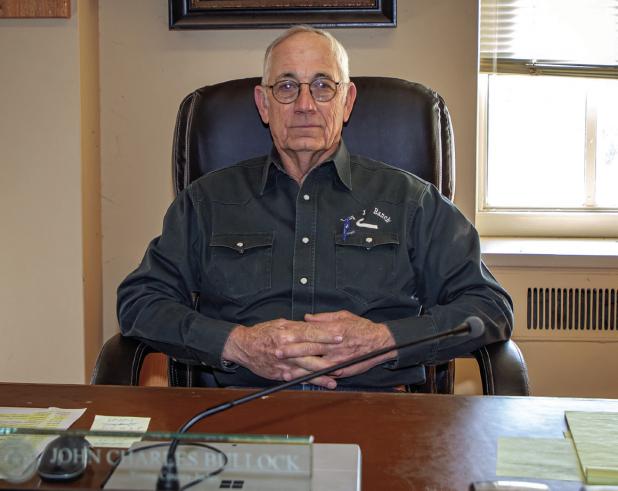
Judge Bullock reflects on time serving the County
John Charles Bullock retires on Dec. 31 after serving Young County for more than three decades as Precinct 2 commissioner and county judge. During his tenure, Judge Bullock has served with ten commissioners and three county judges and has seen shifts in shifts in population, its business base and technology.
The Enterprise interviewed Judge Bullock on Dec. 19 about his memories and his plans.
Enterprise: What was your favorite part of this job?
Judge Bullock: The judicial work is my favorite. I’ve taken a real liking to that. Within the judicial work, there’s both the criminal side and the civil side. I don’t want to be morbid but I like the probate work better than anything. I’m real acquainted with most people here in the county and probably 50 percent of the will probates or the applications for administration - those without a will - I’m pretty familiar with the family or the decedent or the decedent’s family. Sometimes it gets like a family reunion, if you will. After we go through the process, we may sit there 30 minutes afterward and tell stories about what used to be and how we came to know one another.
Q: In your 32 years, what stands out about the job of commissioner and county judge for you?
Judge Bullock: Being able to satisfy someone’s desire or someone’s need. Basically if they needed some service or they needed someplace to go or they needed an idea to pitch around, if I could be of any help to them that’s the greatest satisfaction that you have out of one of these offices.
Q: What problems does incoming County Judge Win Graham need to focus on?
Judge Bullock: We’ve only had one mental health referral to North Texas State Hospital in the last 14 or 15 months that’s the only hospital that we have real access to for court-ordered [competency and restoration services]. We have to wait six to 18 months to get anyone in there.
In this court, 12 months is the longest sentence we can produce. Most of the time, [mentally ill defendants] have completed their whole sentence before their spot comes up for mental health services. The only option you have there is to turn them loose on a [personal recognizance] bond or dismiss the charges. [The new judge and commissioners] need to get the ear of our legislators to correct those problems.
Q: What did you champion projects brought to the court by Friends of Fort Belknap and the Young County Historical Commission, such as restoration of the 1921 jail in Graham?
Judge Bullock: It’s our his- tory and I want some things to remind us of our history and where we’ve been, where we’ve come from. This 1921 jail has got some of the cells still in it, although they’ve had the doors taken off of them. I’d like to see those put back in some of [the cells] so we would have that as a historical relic. I think it would bring more to the county and the city here in Graham and as far as historical visitors.
Q: What do you think about the influx of people into Young County in the last few years?
Judge Bullock: I don’t know what the average price would be on a 320-acre survey of land now but it would probably be $3,000 or $4,000 an acre at that size … and those little 10- or 15- or 20-acre patches could go up to $10,000 or $12,000 an acre. For business purposes, it’s out of an agriculturalist’s range - way out. There is not enough profit in it to survive unless you are operating at a really really large scale. That’s disappointing to me but it’s progress and if they are willing to give [that price for land] you have to let them have it.
I don’t necessarily like that but you either grow or you shrink in the life of a county or a community. Growth takes population, economic growth means more people, lower taxes means more people, to build homes, build buildings, build businesses and increase that tax base.
Q: Are you interested in another public service job? Judge Bullock: I’m just going to go back to livestock tending and fence mending, where I came from. I get along pretty good with my cows. They don’t talk back to me. When I call, they come.
